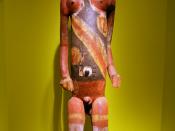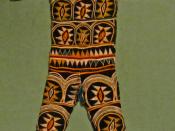Achebe uses many of the folktales and proverbs that are common to the Ibo people along with some common mythology that exists in all cultures (such as the proverbs about the silence of night). The mythology/proverbs/folktales in which Achebe chooses to incorporate to the story is provided for the specific purpose of adding depth and reasoning to the decisions of all the characters that are part of the Ibo culture. Without having those insights into the Ibo people, all of their decisions and actions would be seen as a "barbaric" function of the culture, a view that follows what some westerners believe is true about the Sub-Sharan cultures of that time. Achebe included to prove that the view of the Ibo people and the African people as a whole is wrong, that they are not a barbaric people but only constrained to follow their beliefs.
The first part of the book, the part that is seen as Ibo life and culture before the comming of the white man, displays a view of a "pure" Ibo culture, a form of the Ibo culture that has not made way for change (as seen in Okonkwo's conversations about other villages as opposed to Umofia) and therefore is the true essence of the culture.
What is seen in the beginning, in the "true" Ibo, is a sofisticated culture that is not barbaric when seen in light of its own customs and not of those of Europe. The way that the first section of the novel can be seen as a response to the depictions of Africans in Western literature, is that in Western literature Africans are seen as barbaric savages with no rules on their behavior - Things Fall Apart shows that Africans are completely different than that depiction.
In the beginning of the...


